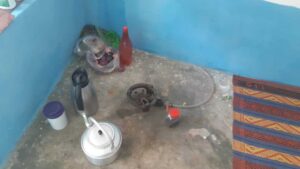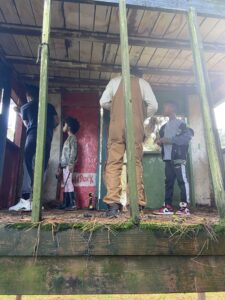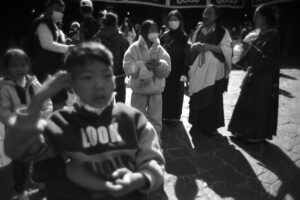Tackling a New Project – Week 1
![A typical evening in Changzhou's commercial downtown core in February 2022 [photo by: Theresa Boersma] An ebike driver sits parked on an ebike at an intersection at night as blurred traffic flows by. Lights from tall buildings color the background.](https://blogs.ed.ac.uk/ls_efie11121_efie11122_2022_23/wp-content/uploads/sites/6900/2022/09/Changzhou-scenes-Feb-2022-5_edited.jpg)
“What is this thing?”
Good morning/afternoon/evening from Changzhou, China. This week—my first at the University of Edinburgh—has been an exciting one filled with figuring out where everything is (virtually since I’m commuting from across the planet).
I began this week thinking I had a whole year before I really needed to start honing in on a topic for my final project for my MSc in Data, Inequality, and Society. I figured that would give me enough time to get settled in, pick up some skills and ideas, work out contacts and connections, and then unveil an organized, thought-through proposal piece-by-piece detailed via polished blogs after putting in the time to understand how everything works and what access I can finagle.
Then an email arrived, saying that even though I’m in the two-year program, I would need to start blogging immediately. Oops! Looks like you’re stuck walking with me through this messy process.
- A student in a USAID-backed journalism program in Herat, Afghanistan was helping his mom make “cookies” for a holiday celebration in May 2021.
- Six months after these photos were taken, the student found himself embarked on a dangerous one-way trip out of his country. He has not seen his mom in over a year.
“Who Am I?”
I came to the Data, Inequality, and Society program from a journalism background (You can see my LinkedIn page here and my Twitter feed here if you’re interested). Most recently, I finished up an MA in journalism at New York University. The last year of that program was intense as I threw myself into domestic violence and trauma reporting coupled with attempting to help Afghan refugees (particularly those employed in the journalism industry) to flee their country when the Taliban returned to power.

After fleeing Afghanistan, a previously middle-class family (father, mother, and three small kids), found themselves scrounging for supplies in a precarious hiding place in Pakistan as they waited for help from International refugee organizations. The help never arrived, and family members spent much of winter 2021/22 sick and shivering in a small concrete room. [photo courtesy of the family]

Kids exploring a treehouse in North Carolina, USA in late 2020. Shortly after their mother took this picture, the kids were seized by the local government which led to a trans-state custody battle that would span the rest of their mother’s life.
So I want to explore what’s going on in the world in hopes of finding solutions to make things somewhat more survivable. We as a society have built these incredibly powerful systems founded on the idea that we can use them to overcome the world’s ills (disease, starvation, etc.), yet we’re surprisingly okay with letting “losers” within the system suffer and die. I find this puzzling and unsustainable and not at all in the spirit of what we’ve been sold.
“What am I working on at the moment?”
Most of this week has been devoted to reading. For my class in “Exclusion and Inequality,” I decided I needed to tackle both Thomas Piketty’s Capital and Ideology as well as Lucinda Platt’s Understanding Inequalities, which may have been a bit ambitious, given that this is not the only reading I need to finish in the next two weeks. Both have been fairly eye-opening, if at times depressing (Piketty’s is the uplifting read of the two while Platt’s reporting on inequality studies leaves one feeling a bit like inequality is indelible). But I have had a great many “aha!” moments nonetheless.

Pilgrims mingle in a temple in Lhasa in Jan/Feb 2022. Back when this photo was taken, Lhasa had enjoyed most of the COVID-19 pandemic disease-free at the expense of its tourism industry. Alas, that good luck came to an end. As of late September 2022, Lhasa has been locked down for over a month and a half thanks to an especially tricky Omicron outbreak that authorities have only just begun to reign in. [photo by Theresa Boersma]
In a completely different vein, I ran across this story (kinda falls into the category of “press release,” I guess) on WeChat by/about a nonprofit, German government-backed non-profit organization that trains and employs people with disabilities for factory work in a city not far from where I live and how it has teamed up with a tech company to explore how incorporating AI can improve production. I found it to be an interesting project, and something related to AI and people with disabilities could make for an interesting final project.






So glad to know I’m not the only one who also thought I’d have a lot more time to think about the project! It’s interesting to hear how both you & Janel came to this course after supporting Afgan refugees, it gives a bit of hope that the situation has motivated people to want to make a better world rather than despair at the status quo.
I like how optimistic you are about the possibility that people are getting more proactive about helping rather than wallowing in despair. I guess that also happened some after Russia invaded Ukraine, though. Despite struggling with other refugee crises, a lot of people in Europe stepped up to help those displaced by the conflict. So… maybe? It would be nice if governments weren’t skewing so nationalist though and were looking at some of these big ongoing problems like resource bottlenecks and shortages, mass human displacement, and the climate crisis as a longterm, complex network of interconnected issues and not a series of temporary isolated emergencies.
I pondered for a bit on if I really did feel like people were being more proactive (i.e. with refugees) and for a moment worried that the narrative of the helper was so under-shared that I clung on to any hopeful story and gave them undue weigh. But actually yes, I am positive people are getting more proactive, though I think that it is out of an understanding that there isn’t the safety net of a government or similar large organisation stepping in to do so. For example, I fume every time I walk past the food bank donation boxes in our shops because why should a country (the UK) be part of the G7 but also have handed out over 2 million emergency food parcels to people last year? But then I see how full the boxes are every time I walk past and feel grateful that even though our system is broken the people in it aren’t.
I agree re your comments about governments – the short-term election cycle thinking is one of the worst side effects of modern democracy and the nationalist, polarisation of rhetoric because it stands out and gets noticed during campaigning is awful. I do worry about if we are seeing a slide into (from a UK/EU perspective) fascism – but then you see the protests in Russia and the labour strikes here in the UK and have hope that the government narrative isn’t what the majority of people align to (she says, crossing her fingers, toes and nose!)
Hi Theresa, great job on the post. I can relate so much to what brought you to this program. You’ll see some of that in my post tomorrow. I like your observation of “the power of people working within power structures.” I have many idealistic thoughts about how we can “fix” things if only we just…which is a slow process of failures and successes worth striving for while also finding and working within the cracks of the existing machine. Re: that article, I also love the idea of leveraging what organically emerges vs a more artificial intervention which inevitably meets resistance or causes new problems. I’m inspired by your progress on the reading so I’ll go get to it.
Thanks, Janel! I found your post gave me a lot of food for thought as well. You’ve had some really intense experiences this past year+.
Hi Theresa, I found your post very interesting and packed with plenty of food for thought. I resonate with the idea of there being so many barriers built into systems that are supposedly designed to help people…unfortunately the people who find themselves in these situations often don’t have time, energy or resources to spend on overcoming these barriers too.
On your last point, my sister is doing some ongoing research centred around AI and health inequalities. Specifically, she’s deep diving into the influence of people’s protected characteristics (e.g. ethnicity, gender and age) on their perception of the use of AI in healthcare. Let me know if you end up going down this route for your final project- I would be happy to connect the two of you!
Thanks, Maryam! And thanks again for reaching out to me on LinkedIn! It’s neat to get connected outside the program channels. This is so true: “unfortunately the people who find themselves in these situations often don’t have time, energy or resources to spend on overcoming these barriers too.” <- it just makes it all so much more difficult. Such big problems to overcome.